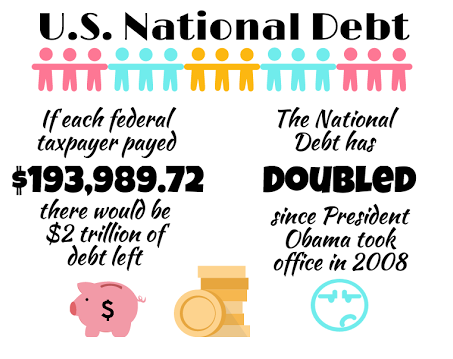At $18 trillion, the U.S. National Debt is continuing to grow without a reprieve in the foreseeable future. With this economic burden on America’s shoulders, the next few generations must learn to carry the weight, yet many students do not understand what it is or why it is important. In order to fix a problem, people must understand what they are facing.
What is the National Debt?
The national debt is the total money that the government has borrowed from various sources. The debt began to increase during the early 2000s after the tragedy of 9/11 and the resulting Iraq and Afghanistan wars. Combined with a large budget and continued funding for these wars, the national debt grew rapidly. “It is easy to allow the debt to get out of hand when there is an immediate crisis that needs to be fixed,” said Economics teacher Susan Eryan. “Politicians are elected with the intent that they will often times lower taxes and offer more programs to the American people, so often times national debt takes a backseat.”
What is so bad about National Debt?
Theoretically, national debt helps the economy grow. According to npr.org, “Government debt, sometimes, is a good thing.” A healthy balance between the national debt and the deficit–the difference that develops when the government spends more than it makes–can help in times of economic stress. However, based on projections made by the Concord Coalition, a nationwide, non-partisan organization that advocates for generationally responsible fiscal policy, the debt is to exceed 106% of the Gross Domestic Product, an unsustainable level. This could mean that the government might not be able to sustain itself or its programs because of the outrageous amount of debt breaking its back. Balanced responsibly, national debt can be an advantage in the economy, but at this uncontrollable rate, it is bound to have negative effects.
Is it even possible for the National Debt to be fixed?
“It is possible for the debt to be controlled as long as both political parties work together to be fiscally responsible,” said Eryan. Fixing the national debt is not as easy as gluing the broken pieces together and it will never fully go away. It can be controlled with effort from both the elected leaders of our country and its people.
How will it affect students when they are grown?
As the rising generation, many students will be affected by every economic decision the government makes–some will even be making the important decisions that affect millions. Because of this, it is very important that future leaders and voters understand the national debt.
What can people do now to help the future?
Every small effort is worthwhile. Any average citizen can make a difference; “it is helpful to write letters and address this with their state’s representatives to send a clear message that this is something important to the people and needs to be addressed,” said Eryan. Students can advocate for less government spending. According to nationalpriorities.org, defense spending accounts 55% of the federal budget. Furthermore, “health care inflation places a strain on the federal budget and is the largest factor in the federal budget’s long term unsustainability,” (Concord Coalition). Advocating for budget cuts on Defense, Health Care Reform, or other programs can help to create a balance in the National Debt and federal deficit.
For more information about how to get involved, visit concordcoalition.org.
Debt Breaks Backs: Understanding the inherited national debt
May 14, 2015

0
More to Discover







